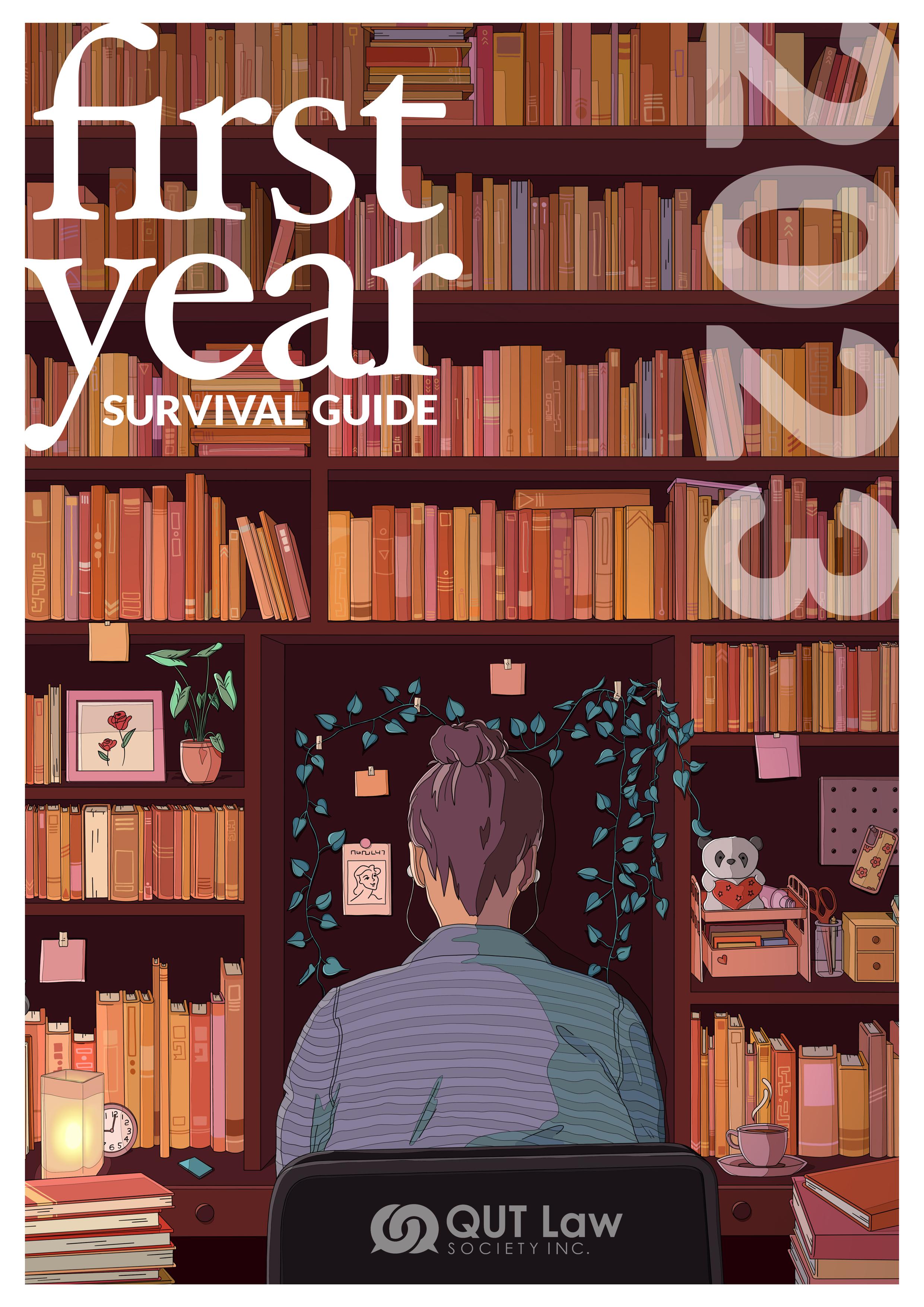
ACKNOWLEDGEMENTS
The QUT Law Society would like to sincerely thank the following people for the creation of this guide:

HARRY JANS
QUTLS President
JORDAN PAIVA
Director of Media & Communications
DARCEY LEE
Publications Officer
ALLISON KRICKER
Design Officer
... and the QUT Law School!
We would also like to thank everyone who has contributed to this guide and to the wider QUT Law community. This includes all the QUTLS Directors, Officers, academics and students who have shared their experiences, knowledge and efforts with us so that we could build this publication and help guide first years.
RECONCILIATION
The QUT Law Society respectfully acknowledges the traditional custodians of the land upon which it works, the Turrbal and Jagera people, and pays its respects to their Elders past, present and emerging.
We recognise the contributions that First Nations people make to society, and celebrate First Nations success. The QUT Law Society is committed to inclusion, reconciliation and consultation to ensure the future of Australia is one where First Nations people are afforded equal opportunity.

The QUT Law Society demonstrates its commitment to reconciliation through numerous events and programs facilitated throughout the year.
There are many upcoming opportunities to acknowledge First Nations history, both within Meanjin, the QUT community and beyond.

In 2023, the QUT Law Society welcomes commencing First Nations students, and wishes you every success in your studies.

FOREWORD

Welcome to the QUT School of Law and the beginning of your professional future.
I’m delighted that you’ve chosen us to provide you with the real-world learning experiences, professional opportunities, expert teaching and industry connections that will empower you to achieve your career goals.

Completion of a law degree leads to a wide range of different careers both within the legal profession and beyond. More importantly as a law graduate you will be a leader and community advocate. As you commence your law studies, I encourage you to reflect on why you chose to study law and what brought you here, whether that is because you are passionate about the law and want to make a difference in the world, or because of the many career opportunities a law degree brings.
You will start to develop skills and experience right from the beginning of your law degree at QUT. Our law course has been designed in consultation with industry, and has strong foundations in contemporary legal knowledge and practice. We maintain strong connections with industry that allows us to offer practical and effective hands-on learning experiences. We have exceptional facilities, including a city campus with court rooms and a dedicated law library. Should you decide to practice law, we also offer a seamless pathway beyond your law degree to become an admitted legal practitioner. We’re Brisbane’s only university to offer the Graduate Diploma in Legal Practice—an essential qualification to be admitted as a solicitor in Queensland.
The advice offered in this guide is invaluable because the QUT Law Society team are in the midst of their degrees and can provide a unique perspective on studying law. Although we encourage you to dedicate time to your studies, we also hope that you take advantage of the many extracurricular opportunities on offer and how these can enrich your time as a student. I hope you consider entering some of the Law Society’s competitions, including the First-Year Moot, which provides a taste of the mooting program here at QUT and is but one of the many extra-curricular activities you can be involved in throughout your studies.
I trust you settle in well to student life at QUT Law, and I wish you all the best with your studies.
PROFESSOR SHARON CHRISTENSEN HEAD OF THE SCHOOL OF LAW

PRESIDENT’S LETTER

Welcome to the QUT Law School! Whether you’re straight out of high school, changing degrees, or even changing careers, the QUT Law School is keen to have you on board.
Becoming a QUT Law Society member gives you access to a vast array of events, information sessions, workshops, competitions, and even performance opportunities ranging from competitions, information sessions, mentorship opportunities, social sports, networking events, the Law Revue, and so much more. Keep reading this guide or visit our website for more information about what it is we do, and what the QUTLS can do for you as a member.
I’m halfway through my dual degree, so still have a couple of years here ahead of me. In the time I’ve been here, however, I have learned a lot, and have a few key tips to share with you that help

My first year was a lot to wrap my head around, as I’m sure it is for you as well. What helped me was trying new things and developing friendships, and looking back, my first year was the perfect time. Make friends, join a passion project, and be a part of your law school’s community. Half a lawyer’s job is

It’s indisputable that preparation will be your greatest ally at uni. Build the habit of beginning assessments early and preparing for classes. This being said, life happens sometimes. If you aren’t as prepped as you’d like to be (or not at all), rock up to your tute, participate and ask questions anyway. Attending tutorials - prepared or not - makes a massive difference during crunch time (especially since exam content is generally derived from tutorial questions!).
Sometimes ‘doing you’ is self-care, and other times it’s stepping out of your comfort zone. Whatever it is, do it for yourself. Finding something personally and professionally fulfilling transformed my uni experience, and it will do the same for you.
If you want to know more about the QUTLS, or just want to chat with someone on campus, our office is on Level 4 of C Block. Also, feel free to chuck us a message through our social media platforms. We look forward to meeting you, and best of luck with

CON NTS TE 01 02 02 Welcome! What’s What at University 03 Meet the First Year Officer 05 High School versus University 06 A Guide to Different Types of Assessment 07 How to Succeed 08 Perks of Being a Uni Student 09 Legal Industry and Pathways 11 Lonely? Follow These Socials 14 16 Tips From High Achievers 16 Tips From Faculty 20 Navigating Campus 18 Z-Etiquette 24 Citation in Law 26 Outline of Your First Year 36 About the QUT Law Society TABLE OF 52 Word Search
let’s get this party first year started! let’s get this party first year started! let’s get this party first year started!

So while we’re here on the opening pages, let this booklet give you some sage advice:

1. Forget everything you know about university thus far; your university experience will be what you make of it.


2. Get involved! University is a lively place with all sorts of characters. Make it your mission to experience as many wholesome things as you can!
3. Take it easy and PLEASE take care of yourself! Whilst getting good grades in law school and acquiring that dream career is super important, just remember that getting too invested in your studies can detract from other aspects of your life. It’s all about balance, so make sure you look after your physical, mental and social wellbeing. Reach out for help when you need.
Now go, my friends... go get those degrees and make us all proud!
Jordan Paiva Director of Media and Communications on behalf of the QUT Law Society
1
WHAT’S WHAT AT UNIVERSITY
Lecture. A lecture is a session where a weekly topic is delivered to students in that subject. At a bare minimum, all students are expected to engage with the weekly lecture material. Lectures for first- and secondyear subjects will usually be a two-hour lecture delivered by a lecturer on campus in-person. Lectures are typically recorded and uploaded to Blackboard. BlackBoard is being replaced by Canvas in 2023 and will have the same, if not similar, functionalities.
The Law School places heavy emphasis on student autonomous learning. As such, in third and fourth year, lectures will not occur in person and will usually be structured in more of a ‘podcast’ style delivery, with a number of short videos that relate to particular parts of a broader topic. These are typically pre-recorded and will be uploaded to Canvas each week or a few weeks in advance.
Tutorial. A tutorial is a class that goes for one to two hours. During a tutorial, students have the chance to workshop questions that test their knowledge of the weekly material. Law tutorials are where you will undertake the practical preparation for exams by way of answering problem scenarios in a special legal analytical framework called ISAAC ISAACs.
I = IDENTIFY ISSUE
S = STATE THE LAW
A = CITE AUTHORITY

A = APPLY THE LAW
C = CONCLUSION
Take note of visiting hours! This is where your lecturers (and sometimes tutors) will allocate a time each week to make themselves available for you to visit them in their office on campus and ask questions! Other ways of contacting your teacher during visiting hours may be via Zoom.
Readings. Readings describe the prescribed textbook pages or chapters, legislation and case law that is relevant to the weekly subject matter covered in your lectures and tutorials. These readings will be listed in a study guide and located inside a learning resources weekly tab in Canvas. In your first and second semesters, you will be taught in class how to read and interpret court cases and legislation. In later years, you will be expected to know how to read and understand cases and legislation by yourself. Do not be afraid to ask your tutors and the law librarians for lots of help! It is better to ask for lots of help in first year than it is in third year.
Workshop. Not every subject has a regular workshop on top of the scheduled lectures and tutorials. Nevertheless, a workshop is a further opportunity to *literally* workshop your knowledge and skills. In first year, you will likely encounter the Torts Peer Workshop program. You will also have several research workshops with the law librarians where they will show you how to do legal research using the databases that QUT has access to (for example, WestLaw and LexisNexis). Workshops will usually go for one to two hours in an intimate setting. It is very similar to a tutorial.
Workshops are more common in other degrees such as Creative Industries (double degree students, take note!).

2
MEET THE FIRST YEAR



OFFICER
MEET THE FIRST YEAR OFFICER





Hi First Years! Welcome to QUT and to law school!
My name is Ashlee Parrott, and I am QUT Law Society’s (QUTLS) First Year Officer for 2023. As the title suggests, my role is to help you out with your transition into university. I do this through encouraging you to join in with our QUTLS events (especially those aimed towards first-year students), as well as being a friendly face around campus and on our First Year QUT Law Students 2023 group on Facebook.

A little about me: I jumped on the law school train a little later than some. In high school, I was Criminal Minds, and more specifically Spencer Reid, obsessed. I decided that’s what I wanted to do with my life… be Spencer Reid. After a quick google, I discovered that the closest I could come to being Spencer Reid was being a Forensic Psychologist. Lo and behold, I started a Bachelor of Behavioural Science (Psychology)/Bachelor of Justice majoring in Criminology and Policing in 2018, with the aim of becoming a Forensic Psychologist (a real-life Spencer Reid). About halfway through, however, I decided that I wanted to be more involved in advocating for people and therefore this wasn’t the career for me. Nonetheless, I completed this double degree in 2021 and now I am here – in a Bachelor of Laws (Honours) – Graduate Entry.
ASHLEE PARROTT
A bit about my first-year experience: Technically, I have been a first-year student at QUT twice now, and both experiences were completely different. I was fortunate enough to avoid COVID in both of the first years of my degrees, and therefore both experiences have involved full-time on-campus study. When I began my Psychology and Justice dual degree, I was super excited to make friends at uni. However, I merely attended all my classes and then left campus. In fact, it was like that for the four years that I spent completing this degree. When I started studying law, I was determined to make my experience different.
3
My first tip: attend class in person!
I have done the whole online university thing, and whilst it is great for saving money on travel and the daily Bagel Boys (you’ll know what I’m talking about after a few weeks), it’s terrible for making friends. No matter how much we all hate to say our name, degree and a fun fact about us in week 1 classes, it starts the conversation with strangers that you might otherwise be afraid to start… and
As a first year in law, I didn’t need to be shown around the university, or told how Blackboard (our old Canvas) worked, as I had done it all before. However, I still joined the mentor program to meet someone who had experience in studying law at QUT, and boy am I glad that I did. My mentor (shout out to Morgan) gave me the full run down of how to make the most out of university and be introduced to the legal industry, including what events are best to attend, when to apply for jobs in a firm (P.S. it’s never too early), and how to navigate AGLC4 (if you’re not sure what AGLC4 is, find out by asking a mentor). This was advice that I have held with me since!
Don’t fall into the trap that I did initially. QUTLS offers a range of events including pub crawls, sport, the Women in Law Breakfast, the Law Ball, LetsGetRekt, and moot competitions. Most events cost no more than a couple of coffee’s and it’s a great way to meet new people and get the most out of
My friends and I like to say that it’s not what you know, it’s who you know when it comes to the legal industry. Making friends in university will not only be beneficial for you now, but they may form a network of future colleagues that open up a world of opportunities


QUTLS prides itself on our inclusivity, including the accessibility of our events and the welcoming nature of our society. Any society related queries can be directed to secretary@qutlawsociety.com or you can visit us at C Block, room C402 during our office opening hours (which can be found at https://www.qutlawsociety.com/).
I’m looking forward to meeting you at the First Year Pizza Party in
m ~12 hours a week contact time.
m Learning is typically divided into lectures, tutorials.
m Large lectures and disparate student-to-academic staff ratio.
m No opportunity to draft or check assignments directly with tutors or lecturers. Can talk to the Student Success Group.
m Highly independent and autonomous learning. At university you are left to your own devices.
m Lots of time to pursue sporting, hobby and faculty-related extracurriculars!
m More freedom to choose classes, so you won't get to know everyone in your tutorial (unless you really want to!)

m More individualistic classroom culture - tutors usually also work in their industry and are time-poor.
m You can wear whatever you like!
HIGH SCHOOL
m ~35 hours a week contact time.
m No difference in class structure. Usually just called double and single periods.
HIGH SCHOOL VERSUS UNI UNIVERSITY
m Intimate classroom settings with lots of access to teacher’s help.


m Opportunity to draft work with teachers to perfect assignments.
m Highly guided and supported learning. Teachers chase you up for homework and assignments.
m Not a lot of free time to participate in extracurricular activities.
m Seeing the same people each day and getting to know one another.
m Emphasis on close-knit classroom relationships with peers and teachers.
m Have to wear a school uniform.
Assignments
In the Law School, assignments are rather different from the other types of degrees and vary greatly from subject to subject. Despite this, they all have a few things in common. For example, the standard referencing style for law assignments are WALS and AGLC4. Make sure you always read the task sheet carefully so you know what is expected of you.
Assignments can be oral, written, or may take the form of a short online quiz.
Research Essay
A research essay or critical analysis essay are a type of essay that will require you to wield your research skills to the best of your ability. A research essay often involves researching the current law surrounding a topic and analysing the issues related to it.
Advocacy Exercise
This assignment is given so you can practise your advocacy skills. For example, in the subject LLB106 Criminal Law, the idea is for you to improve your oral skills in a ‘court’ context and enhance your ability to succinctly and effectively defend a ‘client’ This type of assignment might take place in class or through submitting a recording of yourself presenting to the camera.
Tip: You can prepare for this assignment by attending a Moot Club or competing in one of the QUTLS’ many competitions with a friend.
Group Assignment
At uni you will come across group assignments. To ensure that everything goes smoothly, try to ensure that everyone’s expectations are aligned. We recommend that you often meet in-person or over Zoom, as well as go over the task together to divide the tasks evenly and set your own deadlines. Download an app like Asana or Monday.com to check up on everyone’s progress and make sure that everyone knows what they are doing.
A GUIDE TO DIFFERENT TYPES OF ASSESSMENT
Client Letter
This type of written assignment is where you step into the shoes of what it would be like to be an actual legal professional writing for a client. You need to decide what information would be relevant to the client while remaining succinct and to the point. It is very important to explain legal concepts in simple, lay terms. Clients do not want to read information they do not want to know so you will need to make tactful decisions on what they need to know and what they dont need to know.
Memorandum
Much like the client letter, this kind of assessment also lets you step into the shoes of an actual legal professional. Instead of writing for a client, you are writing for another legal professional. Here you can use more legal terminology which would not be appropriate for a client. You can use legal concepts that a layperson would not understand, Again, it is important to write succintly and to think about what would the supervising lawyer want to know and what would they not want to know.
On-Campus Exam
Exams typically take place on campus during the ‘examination period’ and are roughly three hours long. They are invigilated (supervised) and can be open or closed book. Open book means you are able to bring in external notes with you into the exam.
Although you won’t receive individualised feedback on your exam papers at university, you can still seek feedback to improve your marks. One way of doing this is by asking your tutor to give you some pointers, or by taking your exam responses to the Student Success Group for feedback.
Take Home Exam
Don’t underestimate the take home exam! Similar to invigilated exams on campus, you should prepare just like you would for a ‘normal’ exam. The exams are usually written in exactly the same format as an invigilated exam. In 2022, the take home exam was timed with additional time added for you to submit your exam answers.
Pay close attention to the word count on your exam submission as markers will usually stop reading and assignment marks once you exceed the word limit.
Succeed 6
TIPS
• Explore your subjects, the HiQ website and Canvas early on to familiarise yourself.
• Download Office365, which gives you free access to the most up-to-date Word, PowerPoint, Excel, OneNote and Outlook programs.
• Make a study group with your peers.
• Sign up to the QUTLS Mentor Program and meet a more experienced law student.
• Go to your lectures and tutorials, even if you haven’t prepared. You will retain info better.
• But... preparation is power! Glance over your lecture PowerPoint slides on the bus or train when you’re going into uni for that lecture, or just before you open Echo360. Write dot points for your tutorial question responses if you do not have time to write a full response.
DO I NEED THAT $200 TEXTBOOK?
• You might have noticed that you have textbooks prescribed for your subjects which can be really expensive! Textbooks assist greatly in reinforcing the lecture material and expanding on that content with a more nuanced analysis of case authorities and legislation. Many textbooks will be called ‘Cases and Commentary’ textbooks. These books include useful extracts of case authorities that summarise the important bits! You probably need to access that textbook to make it easier to prepare well for your exam or assignment!
• NOTE: It’s totally possible to get by without buying a textbook for each subject.
STUDY HACKS
• Change the playback speed of your lectures to suit your notetaking style.
• Exam preparation starts in Week 1. Keep your notes up to date so that you cram less later on!
• Use the Pomodoro method (25 minutes study, 5 minutes break) because research shows that we learn best in small chunks.
• When reading textbooks, use the SQ3R method: survey, question, read, recite, review.
• The human brain is good at remembering the information we handwrite and not so much what we type. Try to write down the important concepts you’ll encounter in exams.
• Print out and bind your Study Guides! This is relatively inexpensive at Officeworks. Or, use the free binding machines in the QUT Library.
• Past students’ notes can be useful when creating exam templates, but ensure that all the content contained within it is up to date!
WHERE DO I GET TEXTBOOKS (AND FOR CHEAP)
• The Law Library offers several copies of textbooks that you can borrow for two hours.
• The QUT Library database also often offers free digital copies that you can access, rent or download (it depends - so check here first!)
• Many law students buy + resell used textbooks through textbook exchange groups and pages on Facebook. Two forums to follow are QUT Epic Textbooks and QUT Textbook Exchange.
• Make a note of the edition of the textbook you’re looking for. Sometimes there may be changes in the law between editions, so double-check with your teacher about which editions are okay to use.
Succeed how to
7
PERKS OF BEING A UNI STUDENT SPOTIFY
As a tertiary student, you have access to a whole range of student discounts to help you save money while you are working on your career!
One great discount service we love is UNiDAYS, which gives you access to heaps of deals on retailers in fashion, beauty, lifestyle, food, health, fitness and technology. It’s also free to sign up to!



Need new gym or officer wear? Do you want to upgrade some of your tech? Just download UNiDAYS from the App Store!
UNiDAYS offers discounts all-year round and seasonal big percentage discounts, so keep an eye on your account for huge savings offerings!
Want to listen to non-stop music while you travel or study? Well you can, and for a discounted membership price too! Spotify offers cheaper memberships for students.
Definitely take advantage of it while you can!
APPLE
Like Spotify, Apple Music also offers student membership discounts.
Also, take note - The Apple Store offers 10% discount on select educational-related Apple products! Before you checkout, make sure you are visiting https://www.apple.com/au/education/ so that 10% discount applies!

UN i DAYS TRANSLINK
Full time tertiary students are eligible for concession fares, so make sure you apply to Translink to get 50% off on all travel on Translink buses, trains and ferries! You can do this on the Translink website once you have your university student number.
8
LEGAL INDUSTRY AND PATHWAYS 1.0
Completing a law degree at university is the first of many steps to becoming a fully qualified lawyer. This section introduces you to the steps you need to take to become a practicing lawyer.
UNIVERSITY DEGREE
The first step to becoming qualified as a lawyer in Queensland is completing an LLB program that consists of a number of core subjects, often referred to as ‘black letter’ law subjects or ‘the Priestley 11’ (such as Torts, Criminal Law, Constitutional Law and Corporate Law). You also need to take some electives, where you can choose to follow any interests you may have in particular areas of law (e.g., Family Law) or subjects in different faculties and disciplines.
PRACTICAL LEGAL TRAINING (PLT)
Towards or at the end of your LLB degree, you are required to undertake a course called practical legal training, that aims to provide you with an opportunity to apply all the technical knowledge that you did over the course of your degree. Once you successfully complete your PLT, you will be ready to became admitted as a solicitor.
ADMISSION
POST-ADMISSION EXPERIENCE (PAE)
When you begin your job search, you will see the acronym ‘PAE’ pop up from time to time. It stands for post-admission experience and describes how many years’ experience you should ideally have had after you officially became admitted as a practicing solicitor.
CONTINUING PROFESSIONAL DEVELOPMENT (CPD)
To be continually recognised as a solicitor, the Queensland Law Society requires that you clock up a minimum of 10 ‘CPD’ points a year. CPD means what it sounds like. CPD is a professional and ethical responsibility designed to keep lawyers up to date on their technical knowledge and practical skills so that they provide their clients with topnotch legal services.
BECOMING A BARRISTER
Once you have completed your PLT, you will apply to become ‘admitted’ to the profession. This is a process of applying to the Supreme Court of Queensland to review your character against criteria set out in legislation. Upon a successful admission, you will be issued with what is called a ‘Solicitors Practising Certificate’. This qualifies you to practice as a solicitor. To practice as a barrister, you need a barristers practicing certificate.
Once you have completed your degree PLT and obtained a Solicitors Practising Certificate, you can embark on the following steps to become a barrister:
• Pass (3) Queensland Bar examinations.
• Pass the Bar Practical Course
• Apply for a barrister’s practising certificate
• Undertake the Readership program, where you will get more practical experience for at least 12 months under the supervision of two mentors (usually more senior membres of the Bar)
9
LEGAL INDUSTRY AND PATHWAYS 2.0
Having a law degree does not mean that you must practice law. The skills you will acquire through undergraduate legal training (critical thinking, creative problem solving, persuasion, research, oral and written communication, time management, and people skills) can be transferred over to any and every industry.
FINDING A JOB AT UNI
COMMON CAREER PATHS
• Clerkships
• Graduate jobs
• Associateships
ALTERNATIVE ROUTES
Not everyone will receive a clerkship, and not everyone is suited to doing a clerkship. There is no need to fret if you do not feel the clerkship call or you apply to them and do not receive any offers. There is still a plethora of other career routes that will lead you to great success. The QUT Law Faculty and the QUTLS host many events throughout the year that will give you the chance to engage with professionals from every corner of the legal industry. This includes top tier firms, community legal centres, the courts and government.
AN INDUSTRY SNAPSHOT
• Top Tier Firms
• Mid Tier Firms
• Boutique / Specialist Firms
• Policy and Government
• In-House Legal Counsel
• Community Law Firms
• Legal Tech / Start-Ups
• Courts / Tribunals
• Academia
• Alternative Dispute Resolution
• Seek
• Indeed
• UniHub

• Goinglobal
• LinkedIn Jobs
• Jobs board via QUT

• Student Success Workshops
• Book career one-on-one appointments
• Facebook groups - for example, QUT Law Students, Fellow Surviving Law Students, and the QUT Law Society will post available jobs
CAREER EDUCATORS
Career educators can review your resume, cover letter and any responses to selection criteria on job postings before you apply for a role!
Also, keep your eye out for the QUTLS Springboard Careers Guide that will be published in April. This guide will provide more information about the various job options that are open to you.
• Note - many different types of businesses will accept graduates with law degrees!
10
LONELY?FOLLOW THESE SOCIALS
QUTLS FACEBOOK
https://www.facebook.com/qutlawsociety/
QUTLS INSTAGRAM
https://www.instagram.com/qutlawsociety/
QUTLS LINKEDIN
https://www.linkedin.com/company/quotals-inc-/
QUTLS YOUTUBE
https://youtube.com/@n8618895
QUTLS ISSUU







https://issuu.com/qutlawsociety
STUDENT COUNSELLING SERVICES
https://www.qut.edu.au/about/contact/groups/student-counselling
Follow These Facebook Pages:
• QUT Law Students
• QUT StalkerSpace 2.1
• FSLS - Fellow Surviving Law Students
• QUT Faculty of Law and Justice Students (private group)
• LLBHelpMe
• LWOB
• Pride in Law and QUT Women In Law
• Any subject-specific Facebook groups (N.B. these are not moderated by academic staff)

11
Graduate and clerkship programs
Each year, we offer clerkships to law students who want to be involved in the real work of a legal firm – not just to observe. We will provide you with the fundamentals to truly understand our business and clients, across all industry sectors and services.
Our 18-month graduate program is an opportunity for recent law graduates to complete a structured training program in a highly supportive environment. Participants will gain exposure to different practice groups within our firm while completing the fully funded Practical Legal Training (PLT) program.
Clerkship program
Our clerkship program is not only a great opportunity for law students to gain valuable practical experience, but it’s also a chance to understand our mission and the culture at McCullough Robertson. Many of our clerks will go on to join our firm through our graduate program.
We offer clerkships to pre-penultimate and penultimate law students in our Brisbane office and clerkships to penultimate law students only in our Sydney office.
Selection process
Apply
Submit your interest in a clerkship with us
Learn more about us
Meet the team and learn more about the firm
Graduate program
Interview(s)
Meet the Partners and Senior Lawyers
Offers made Congratulations, welcome to the team!
Our graduate program consists of 2 x 9-month practice group rotations to complete a qualification to practice while undertaking invaluable on-the-job training. Participants develop their skills with exposure to a variety of legal work with the possibility of joining the firm permanently on completion of the program.
Program structure

Placement 1: Becoming a qualified lawyer
February Formal training:
• Practice Legal Training (funded)
• Includes 9 study days
• Learning and development framework
Support network:
• Supervisor #1 (Partner)
• Supervisor #2 (Senior Associate)
• Graduate Buddy (Lawyer)
• Senior Buddy (Senior Associate)
June Complete Practical Legal Training (PLT)

August
Apply to be admitted as a lawyer
Discuss options for placement 2
Write your career story with us
Placement 2: Developing your legal skills
November Work-based learning:
• Move to a new team for additional experience
• Focus on practical application
• Become more involved in client work
Support network:


• Supervisor #1 (Partner)
• Buddy (Lawyer)
August Congratulations!
Now you’ve successfully completed the graduate program, we’ll discuss opportunities to join the team permanently.
If you see yourself taking on real responsibility and forming genuine professional relationships sooner, then connect with us today to start the first chapter in your legal career.
Visit www.mccullough.com.au
Unlocking success. Together
for more information.
12


ELEVATE YOUR EXPERIENCE careers.herbertsmithfreehills.com/au/grads CAREERS IN COMMERCIAL LAW @HSFGRADUATESAU 13
TIPS FROM HIGH ACHIEVING STUDENTS
“At the beginning of each week write a to-do list for all readings, tutorials, lectures and tasks that require completion for the week ahead. Aim to have all tasks completed before the next week begins.
Start assignments early and try to avoid leaving assignments to the last minute. I have learnt it is not uncommon to have lightbulb moments when you are close to completion and realise that something you have written is in fact incorrect.
Ask as many questions as you can. Utilise discussion boards, email lecturers, participate in peer mentor sessions, virtual or face to face tutorials and schedule consultation times with educators if you need a little more help through the semester. The QUT Law teaching staff are there to help.”


“Be persistent. Don’t get anxious if some things don’t “click” immediately. The legal principles you’ll learn will be, at times, counter-intuitive and contradictory. No one is born understanding the law of hearsay, you have to go about learning it – that’s why you’re at uni.

Understand procrastination. People think that procrastination is laziness, but it’s often actually anxiety.
Procrastination is avoiding the discomfort of facing an imperfect draft or a looming deadline. Get your friends together to study to make it more enjoyable or have a chat to the psychologists provided by QUT for free on campus who can help you build resilience and good study habits...”
Write concisely - this is a concept I struggled with a lot in first year but you'll find it is essential to your academic (and professional) success. I found reading past student examples and planning assignments beforehand both helpful ways of developing this skill.
Textbook course reserves are your friend! If you don't want to fork out money for buying textbooks you are able to borrow most prescribed textbooks from the law library for a 2 hour period. It's a great way to get your readings done too!
14
RACHAEL PAXTON | BEST PERFORMING STUDENT IN LLB102 & LLB106
CATHERINE BUGLER | BEST PERFORMING STUDENT IN LLB104 & LLB203
CAIN VAROY | BEST PERFORMING STUDENT IN LLB141




GET YOUR QUTLS PLAYING CARD! 15 23 23
UP TO DATE
EVENTS!
QUTLS
KEEP
WITH
VIEW THE
INTERACTIVE CALENDAR.
TIPS FROM FACULTY

WHAT DO YOU ENJOY ABOUT TEACHING FIRST YEAR STUDENTS IN YOUR UNIT?
I like teaching all law students! Having said that, I really like teaching first year students in LLB107 Statutory Interpretation about our institutions of government and the principles that govern the exercise of public power in Australia.

WHAT ADVICE WOULD YOU GIVE TO FIRST YEAR STUDENTS FOR MANAGING ONLINE LEARNING?
Try not to leave everything until the last minute. There is a lot of content in first year, and it can be overwhelming if you fall behind. It helps to be organised. Set aside time each week to work through your learning activities and readings. This will also give you the opportunity to ask questions of your lecturer or tutor if there is anything that you do not understand.
WHAT ARE THE NEW CHALLENGES YOU HAVE SEEN FIRST YEAR LAW STUDENTS FACING OVER THE PAST YEAR?
It can be hard to feel connected to your class and your teachers if you're not seeing them in person, and some students can find online learning quite a lonely place. It's important to take advantage of the opportunities to engage with other people, not just within your units but also in extra-curricular activities - it will make your university experience so much richer.
WHAT ADVICE WOULD YOU GIVE TO FIRST YEAR STUDENTS FOR MANAGING ONLINE LEARNING?
You've got a lot of flexibility in terms of when you listen to recordings, take quizzes, contribute to online discussions and so on. Try to create a routine for yourself to make sure you keep up with the materials each week. If you're doing your tutorials in an online class, get involved as much as you can. If possible, turn your camera on so your tutor and classmates can get to you know you, do the preparation so you feel confident speaking up, and don't be afraid to ask questions.
16
BRIDGET LEWIS LLB104 UNIT COORDINATOR
DR PETA STEPHENSON LLB107 UNIT COORDINATOR
WHAT ADVICE WOULD YOU GIVE TO FIRST YEAR STUDENTS FOR MANAGING ONLINE LEARNING?


Nothing too different than for face-toface learning: the key is commitment and preparation. Perhaps online learning might not appear to have the same sort of ‘accountability’ that sitting in a classroom has - so maybe it’s easier to put off watching a recording or to be unprepared for a tutorial? But I hope that’s not true. I think staff are going to continue to refine their online teaching approaches, so hopefully it loses any perception (if there is one) of being a more passive option. Commit to a set time each week for listening to recordings, doing readings, etc. Prepare for and participate in tutorials.
WHAT DO YOU ENJOY ABOUT TEACHING FIRST YEAR STUDENTS IN YOUR UNIT?
I really enjoy teaching first-years; like anything, it has its challenges, but I don’t think I would ever leave it. In particular, I like teaching the foundational concepts - things that set you up to be an informed citizen, regardless of whether you ever end up practising law. I also like that first-years tend to be the most eager to learn new things and to get involved. They turn up. They participate (sometimes). There’s an energy and excitement about starting the degree. They listen to all my tangential stories, even the ones that don’t go anywhere. Like the time I parked my car at Shoe Lane Parking; I tied a carbolic smoke ball to my belt, which was the style at time...
IF YOU WERE BACK AT UNI NOW, WHAT WOULD YOU DO DIFFERENTLY?
Nothing! I loved every minute of it (even admin and constitutional law)! Remember to enjoy the experience and be kind to yourself – you have already achieved so much just by being here!
WHAT ARE THE NEW CHALLENGES YOU HAVE SEEN FIRST YEAR LAW STUDENTS FACING OVER THE PAST YEAR?
Many students felt like they were left alone drowning in a black hole because of the online format. Don’t assume that we are absent because you can’t see us face to face. We are still here, working harder than ever, and happy to chat and help you through, you just need to reach out!
17
JOHN O’BRIEN LLB101 & LLB245 UNIT LECTURER, PEER PROGRAMS COORDINATOR
KATIE WOOLASTON LECTURER
Z-ETIQUETTE
COVID-19 has disrupted traditional methods of physical teaching and learning. This means our reliance on technology has increased. Many classes may still take place online or on Zoom. Below are a few tips for Zoom etiquette, or ‘Z-etiquette’ for short!
CAMERA ON
• Turn your camera on! It’s less scary than you think and it’s super important to build connections with your classmates and tutor (imagine if you were a tutor speaking to 20 blank camera screens... that’d suck, right? So help them out!)
UNMUTING
• Come off mute to ask your questions! Tutors are often screen-sharing during the class and might not see your question if you only type it into the chat box. Depending on the tutor, they may prefer it if you select the ‘raise your hand’ icon before speaking.
WEAR HEADPHONES
• Wear headphones, as this makes your voice clearer and prevents the dreaded ~zoom echo~
LOG ON EARLY
• Try to log on to the class a few minutes early. This gives you enough time to get yourself organised and helps the tutor start the class on time. Some tutors might also use this time to chat informally with the class, which is a great opportunity to connect.
INTERACT IN CLASS
• Try to be helpful to the tutor -- respond when they ask if you can see something, politely let them know if there is a technical problem or if someone has asked a question in the chat box that the tutor may not have seen.
PROTECT YOUR DETAILS
• Never share the Zoom details or passcode with anyone who is not supposed to be in the class. This is a recipe for disruption, as well as being a violation of your tutors’ and peers’ privacy.
FIND QUIET SPACES
• Try to find a quiet space to limit background noise around you. You could even book a study room on campus
PREPARE BEFOREHAND
• Prepare for your tutorial just like an in-person class. Be ready to answer questions and contribute to the discussion - along with asking questions, these are some of the best ways to make sure you’re understanding the topics being taught.
PAY ATTENTION
• Try to be at your computer the whole time the class is in session. There are no marks for attendance! If the tutor asks you a question and all they get back is your mic and camera off, everyone will 100% know about your sneaky tea and biscuit break.
BE POLITE
• Try not to talk over other students or the tutor.
• Be respectful of your peers and tutors and aware of what you are doing while on the Zoom call. A good rule of thumb is to not do or say anything while you are on the Zoom call that you wouldn’t want everybody in the class seeing or hearing.
• If there’s lots of background noise where you are, try to stay on mute to reduce distractions for everyone else.
HIDE DISTRACTING BACKGROUNDS
• Is there a lot going on behind you while on Zoom? Or do you just want to hide your messy bedroom? Luckily, Zoom has a feature that allows you to add in a background (like green screen) behind you while your camera is still switched on. You can easily use a Zoom background preset or download an image of, for example, a nice and tidy office room.

18
ANATOMY OF AN EMAIL

Written communication cannot be understated in law school. Your lecturers and tutors are busy people who juggle lots of different things in their professional and personal lives. Keep any email correspondence short and sweet, and polite, of course! Below is a recommended format for emailing academic staff.
Make sure you email the tutor at the email address they provide to you on Canvas, not one from Google.
Most of the teaching staff will encourage you to address them by their first names, but take a note of their preference if they mention it.
Get to the point quickly! As a clear question if you would like an answer about something

Remember to always include your student number in the email. A simple email signature is the perfect place to pop it in.
Utilise the Canvas forums and announcements in your subject tabs. Only send an email to your lecturer or tutor if oyu cannot find the answer to your query anywhere else. Otherwise, you can also ask questions during your lecturer’s consultation hours.
NAVIGATING CAMPUS
Your first time at university, whether it be Kelvin Grove or Gardens Point Campus, may feel like stepping into El Dorado. But, the next question becomes, how do I get from the City of Gold to W Block before the next tutorial starts? A good rule of thumb - at least for law school, is that most classes will be on the riverside of the campus next to the freeway overpass.
HOW TO EASILY FIND PLACES
You could ask someone to show you where things are, or you can download the QUT App and select the ‘Campus’ tab. In this tab you can generate a map of either Gardens Point or Kelvin Grove and search a buiding name such as ‘O Block’ or facility type like ‘library’ or ‘shuttle bus’.
TIP
Take some time out of Welcome Week to take a look around campus before the semester officially starts. There are plenty of great places to eat and drink, as well as procrastinate that upcoming assignment. Should you feel the need to work off all of that Statutory Interpretation stress, there is a conveniently placed gym and swimming pool located on both campuses.
NOTABLE CAMPUS SPOTS
To find the food court, Botanic Bar or the QUT Textbook Shop at Gardens Point, simply head over to P Block (everything is beneath P Block). To find the food court, the Grove Bar, QUT Textbook shop or Post Office at Kelvin Grove, head over to C Block.
FINDING THE QUTLS
The QUTLS is located on Level 4 of C Block, the home of QUT Law and the Law Library. Just turn right once you enter the building and you will see a window where you can talk to QUT Law Society members (when it’s open).
QUTLS location and opening hours:
• QUT Gardens Point C BLock, Level 4, Room 02 (C402)
• The QUTLS office is open during the teaching period of each semester:
Monday - Thursday 9:30am - 2pm (on break between 11:30am - 12pm)
Tuesday - Thursday 5:30pm - 7:30pm Saturday 10:00am - 12:00pm
FINDING THE LAW LIBRARY
To reach the Law Library, just head on up to Level 5 of C Block. On this level you will find a helpdesk, several bookable study rooms and court rooms. There is also a kitchenette with a microwave and hot water.
Level 6 of C Block is the silent level in the Law Library. There are also bookable study rooms on this floor. There are printing stations on both Level 5 and Level 6.
FINDING THE LAW FACULTY - QUT LAW
To find QUT Law on Level 4 of C Block, just head left.
20
FINDING THE OTHER LIBRARIES
Gardens Point Library:
• The GP Library is located at V Block.
Kelvin Grove Library:
• The KG Library is located R Block.
STUDY ROOMS
As mentioned before, you can book study rooms at the library. Bookings fill up fast so it’s best to get in early. Make sure you turn up on time to your booked session; if you’re not there 15 minutes after the seession start time you forfeit your booking.
PLACING HOLDS
Mastering the holds system at the library is an easy way to make yourself feel organised. Simply search for what you’re looking for on the library website. Make sure to use filters to narrow your search, then select the item you’re looking for and click ‘place hold’. The library will even conveniently deliver the item to GP, KG or the Law
BORROWING FROM THE LIBRARY
The loan periods from the library are very generous, so make sure you return your books and resources on time. If you leave a library book languishing in your closet for too long after its due date, you risk receiving an academic sanction (yikes).
GETTING HELP
If you need help with researching, referencing or locating resources, your first port of call (after trying it yourself first) is the librarians. They are research/reference/ resource wizards and are there to help you. You can visit any QUT library location to get help, or book a handy Zoom or phone consultation with a librarian.

21
Library.
CLERKSHIP PROGRAM
If you’re a law student in your penultimate year, our Clerkship Programs will expose you to the fast pace of a full-service commercial law firm and show you the law in action. You’ll be working under the guidance of some of the sharpest legal minds in Australia, on challenging, complex and high-profile transactions and matters. You’ll be mentored by partners and lawyers who are leaders in their fields, in a firm where individuality is embraced and innovation actively encouraged.

GRADUATE PROGRAM
It’s not just about wearing a suit. There’s always a gap between theory and practice, and post-university prospects can be daunting. How do you make the leap to working in the industry?
That’s where we come in.
Once you’ve completed your studies, our national Graduate Program gives you the perfect foundation for your legal career. Our 2.5 week orientation program is designed to ensure that you’ll hit the ground running. It consists of PLT+, local training and a national orientation week in Sydney.
Our rotations will help you discover different areas and find the right fit. From day one you’ll be working on complex and sophisticated legal issues, and with our innovative learning and development approach, you’ll get the support to become the best you can be.
You’ll get…
• Three rotations of six months in our national practice groups
• mentoring from some of the best lawyers in the country
• a buddy who’ll give you the inside information
• meaningful performance feedback so you know you’re on the right track
We hire most of our Graduates from our Clerkship Programs. Occasionally, additional opportunities may arise. These opportunities will be listed on our website.
• continuing legal education programs and professional development support
• the chance to participate in our Community Connect and Pro Bono programs and really give back
• social and sporting activities, because we know it’s not all work and no play.
22
A

Our clerkship program | A pathway to your legal career
Rather than a short-lived summer clerkship, our 12-18 month clerk program means you will be able to immerse yourself in real legal work as a member of our national team. You will get the opportunity to build lasting professional relationships with lawyers and partners that are recognised in The Best Lawyers in Australia as leading experts across a number of legal areas.


We invite applications for our clerk program at various times throughout the year, so please keep an eye on our careers page. Alternatively, you may submit an expression of interest at any time to chewson@piperalderman.com.au.
What do our clerks say?
I never really have a typical day. I could be doing anything from a brief, discovery tasks, research, book building or responding to emails for our Queensland energy class action.
I joined Piper Alderman because of their extensive and rewarding clerkship program. Not many law firms provide longer-term clerkships that allow you a multitude of opportunities to continually grow into law graduates and eventually lawyers.
 Cass Hewson HR Manager
Cass Hewson HR Manager
T +61 7 3220 7735

E chewson@piperalderman.com.au
I would describe our office culture as friendly, focused and impactful.
clerk program that sets you up for the future.
Interested or want to know more?
“
“
“ Adelaide | Brisbane | Melbourne | Perth | Sydney
23
C I T A T I O N IN LAW
HELLO!
In university, you will need to know how to reference / cite what you are writing and researching! The official reasoning behind citation is to give the original authors credit for their own original thoughts. Not citing someone else’s work means you run the risk of being reprimanded for plagiarism and academic misconduct!
At law school we use a system called the Australian Guide to Legal Citation (‘AGLC4’). Not using AGLC4 in your assignment may mean you miss out on gaining marks (or lose them)!9 AGLC4 is completely different to any other form of referencing. When referencing, we recommend you search up the QUT CiteWrite website (an encyclopaedia for citation styles), directly check the AGLC4 Guide andif you can’t figure out how to reference something - consult the law librarians.10
QUT CITEWRITE SITE CITEWRITE: AGLC4



LAW RESEARCH GUIDES
THE BIGGEST THINGS TO KEEP IN MIND WHEN USING AGLC4
• Footnotes, footnotes, footnotes! Instead of using ‘in-text’ referencing like you might use in APA referencing, you will used footnotes whenever you need to provide an authority for your point or give credit for an idea (see AGLC4 rule 1.1.1).
• You will need to provide ‘pin-point’ references to refer to the specific section of a source. There are often used to refer to page numbers or paragraphs (1.1.6).
• Your first reference of a source will be different to your subsequent reference of that source (see rule 1.4.1).
• You can use short titles to make your footnotes and writing clearer with long case or legislation titles (see rule 1.4.4).
9 QUT Law Society (n 2) 20.
10 See ibid.
13 International Covenant on Civil and Political Rights, opened for signature 16 December 1996, 999 UNTS 171 (entered into force 23 March 1976) (‘ICCPR’).
14 Ibid 24.
15 Family Law Act 1975 (Cth) (‘FLA’).
16 Donoghue v Stevenson [1932] AC 562.
AutoSave AutoSave OFF FINALFINALDOC Page 24 of 56 249 words Focus 74% Home Insert Draw Design Tell me Share Comments
AutoSave
AutoSave
AGLC4 QUICK REFERENCE
Below is a quick introduction to what your citations for cases, legislation and journals in footnotes using AGLC4 might look like, using the QUT CiteWrite page. There are MANY different types of sources, so make sure to double check the citation!
FOOTNOTE SUBSEQUENT REFERENCES
CASES (REPPORTED DESCISIONS)
AGLC4 Rules 2.1 to 2.2
ACTS AND REGULATIONS
AGLC4 Rules 3.1.1 to 3.1.7
Case Name (Year)/ [Volume] Law Report Series Starting Page, Pinpoint (‘Short Title’).
Elle v Emmett Pty Ltd (2001) 81 CLR 522, 525 (‘Elle’).
Title Year (Jurisdiction) Pinpoint (‘Short Title’).
Bruiser’s Law Against Animal Testing Act 2003 (Qld) (‘BLAAT Act’).
JOURNAL ARTICLES
AGCL4 Rule 5.1 to 5.7
Author, ‘Title’ (Year) Volume(Issue) Journal Starting page, Pinpoint.

Elle Woods, ‘Pooches and Poison: Animal Testing in Queensland’ (2002) 28(2) Paws for Thought Law Journal 100, 104.
Short Title (n Footnote Number) Pinpoint.
Elle (n 2) 527.
BIBLIOGRAPHY
Elle v Emmett Pty Ltd (2001) 81 CLR 522, 525 (‘Elle’)
Short Title (n Footnote Number) Pinpoint.
BLAAT Act (n 4) s 23.
Author Surname (n Footnote Number) Pinpoint.
Woods (n 20) 101.
Bruiser’s Law Against Animal Testing Act 2003 (Qld)
Woods, Elle, ‘Pooches and Poison: Animal Testing in Queensland’ (2002) 28(2) Paws for Thought Animal Law Journal 100.
WRITTEN ASSESSMENT IN LAW SCHOOL (WALS)
• WALS is the document that sets out how all of your written assessment should be formatted. It also contains important guidance on correct usage of grammar and punctuaton. It’s super important to get into the habit of formatting your assignments according to WALS (soon it will be second nature, we promise!). The name of the game here is compliance; if you format your essays in size 24 Comic
Sans
your work will stick out like a sore thumb to your markers (which is not a good thing).
AutoSave AutoSave OFF ACTUALFINALDOC Page 25 of 56 297 words Focus 74% Home Insert Draw Design Tell me Share Comments
OUTLINE OF YOUR FIRST YEAR
BACKGROUND INFO
A career in the law industry is becoming increasingly competitive but also more diverse than every before. It is important that law students are prepared to meet the demands of the law in 2023 and beyond. Just like the industry, the law degree at QUT is constantly changing and updating to meet these new pressures. As you progress throughout your law degree, you will take a variety of subjects that will qualify you to enter into the workforce as a lawyer or any other career!
THE PRIESTLY 11
As part of your law degree, you will have a mix of core units and elective units. There are 11 core units known as the ‘Priestly 11’. in Australia, the completion of these units is mandatory to become a professional in the legal industry. These subjects are:
• Administrative Law
• Constitutional Law
• Civil Procedure
• Contract Law
• Corporations Law
• Criminal Law
• Equity and Trusts
• Evidence
• Professional Conduct
• Property (real and personal)
• Torts
QUT-SPECIFIC CORE UNITS
QUT also has their own mandatory subjects. These subjects are ones that the Law School believes are highly important to becoming a well-rounded lawyer. You will take a few of these subjects in your first year. These subjects include:
• Introduction to Law
• Statutory Interpretation
• Dispute Resolution
• Contemporary Law and Justice
CREDIT POINTS
A certain number of points are allocated to each subject at university. This credit system is standard across every single degree offered at QUT. Almost all QUT law subjects are worth 12 credit points, or CP for short. This is the university’s way of measuring how far thorugh your degree you are, and it also assists them in making sure you have met all the course requirements so you can graduate at the end!
26
WHAT IF I DEVIATE FROM THE RECOMMENDED COURSE STRUCTURE?
The key word is ‘recommended’, not ‘mandatory’. Tertiary education is different to all other levels of study because it is so flexible. We are all adults on different life paths and QUT Law reflects that fact superbly.
There will be various reasons why you may be unable to follow the course structure. These might include embarking on exchange, failing a unit, taking a break from study for a semester or two, or changing from full time to part time study. Any of these factors will not prevent you from graduating. At most, you will be at university longer than the time frame suggested.
Planning ahead can help you keep on track to graduate as early as possible, but venturing off the beaten path can sometimes open you up to new opportunities too!
PRE-REQUISITES
Almost all subjects beyond the first year will have prerequisite units, meaning you must have passed a certain unit to be able to take another unit. This becomes a problem when you haven’t completed a certain prerequisite unit/s and can find yourself locked out of classes and unable to progress in your degree.
Another important thing to note is that unit coordinators will often try to organise assessment and exam timetables so they are more advantageous for students who are following the course structure, so this will help you avoid having two exams in one day!
ELECTIVES

Electives subjects give you the chance to explore areas of law that you might be interested in practicing in. Electives are broken down into three groups depending on what stage of your degree you are at. These categories are introductory, general and advanced. Below, the three introductory law electives are outlined to get you thinking about what one you might like to do.
A good tip with electives is to keep an open mind about the subjects you want to take. Due to demand, teaching staff availability, and timetabling restraints, not every elective is offered every year. Therefore, if you see a subject you are keen on completing and it fits within your course structure, definitely do it because you do not know when it will be offered next! Also if you are unsure of which elective to pick definitely ask friends or Facebook groups such as Fellow Surviving Law Students for advice on the subject content and assessment.
You do not have to choose law-related electives! If you want to study subjects in different disciplines, you can choose from a list of university-wide subjects. You can also save up your elective credit points to use on exchanges throughout your degree.
27
intro to law LLB101 torts LLB102
Introduction to Law provides a necessary foundation for legal studies by introducing you to core legal knowledge and the skill sof legal reasoning, problem solving, legal writing and research. The assessments are a writing and research skills task, a take-home examination, and a case analysis assignment.
This subject is a Semester One unit.
SEMESTER 1
In this unit, you will apply the skills you are developing in LLB101 Introduction to Law and be introduced to the skills of legal problem solving and legal interviewing and questioning as you look at how the law of torts operates in a real world context. Tort is the area of law that protects people’s private rights and liberties, such as trespass and negligence. The knowledge and skills that you develop in this unit provide a foundation for more advanced units in later years. The study of torts law is required for admission as a legal practitioner in Australia. The assessments are a client interview and advice, a multiple choice exam, and an examination in the end-of-semester exam block.
This subject is a Semester One unit.
28
dispute resolution LLB103
This unit introduces you to non-adversarial approaches to practice and advocacy commonly used in legal practice, such as mediation, conciliation, and negotiation. It also introduces you to the significant and positive role that lawyers play in society in upholding the rule of law and assisting people to resolve disputes. An understanding of these approaches is an important part of legal practice where lawyers must advise clients on the most effective way to deal with a dispute. The assessments are a roleplay exercise and written reflection, and an examination in the end-of-semester examination block.
law & justice LLB104
This unit provides a foundation for the development of your legal oral communication, critical thinking, and collaboration skills that will be further developed in later units including LLB203 Constitutional Law, LLB204 Commercial and Personal Property Law, and LLB303 Evidence. A key emphasis of the unit is on the interaction of Australia’s first peoples with the Australian legal system and introducing you to Aboriginal and Torres Strait Islander legal knowledges and perspectives of law, which will be further examined in LLB106 Criminal Law, LLB301 Real Property Law, and LLB303 Evidence. The assessments are a group oral presentation, a written policy submission, and an online examination in the end-of-semester exam block.
29
contemporary
This subject is a Semester One unit.
This subject is a Semester One unit.
This core unit introduces you to the criminal law of Queensland. Knowledge of criminal law offences and defences/excuses is essential for understanding the type of behaviour that is permitted by the state. Criminal law content knowledge is required for your admission to legal practice. The assessments are an oral advocacy exercise, an appellate brief, and an examination in the end-of-semester exam block.
SEMESTER 1
This subject is a Semester Two unit.
This unit introduces the foundational concepts of public law, the institutions of government and the rules and principles of statutory interpretation in Australia. Knowledge and skills relating to statutory interpretation are essential in legal practice. This unit provides a foundation for the development of your skills in statutory interpretation that will be further examined in more advanced units. This unit also develops your skills in legal research, written communication and problem solving that were introduced to you in LLB101 Introduction to Law. The assessments are a multiple choice quiz, a research memorandum, and an examination in the end-of-semester exam block.
This subject is a Semester Two unit.
30
criminal law LLB106 statutory interpretation LLB107
human rights law
In recent decades, the international community has shown an increased awareness of and stronger commitment to the protection of human rights. However, this progress is far from complete and violations of basic human rights are still a pressing issue for the global community. This unit is a first year elective that is designed to develop the concepts and principles of human rights introduced in LLB104 Contemporary Law and Justice. It explores the theory and practice of international human rights law. In particular, it provides an overview of the history and origins of human rights and international rights and obligations while remaining grounded in the contemporary events and challenges to the protection of human rights. The unit also examines the institutions, instruments and implementation structures of human rights. The unit sets the foundational knowledge of the key issues and mechanisms for regulation and enforcement that are built on in later specialised units. The assessments are a written government report submission, and an examination in the end-of-semester exam block.
This subject is a Semester Two unit.
The unit ‘Introduction to International Law’ provides a foundation for the development of your legal oral communication, critical thinking, and collaboration skills that will be further developed in later units including LLB203 Constitutional Law, LLB204 Commercial and Personal Property Law, and LLB303 Evidence. A key emphasis of the unit is on the interaction of Australia’s first peoples with the Australian legal system and introducing you to Aboriginal and Torres Strait Islander legal knowledges and perspectives of law, which will be further examined in LLB106 Criminal Law, LLB301 Real Property Law, and LLB303 Evidence. The assessments are a group oral presentation, a written policy submission, and an online examination in the end-of-semester exam block.
This subject is a Semester Two unit.
LLB140 international law LLB141 31
regulation of business LLB142 general law electives


This elective unit commences the process of educating you in matters of business and commercial law. It is intended to provide an overview of a number of critical areas in the study of business law. Further, this subject will provide you with theoretical and critical analysis skills. As a law graduate, you are increasingly required to have a strong knowledge base and understanding of business and commerce and have an understanding of how business operates within the context of the Australian legal system. This unit is intended to provide foundation skills and knowledge that are essential for an understanding of law and regulation as it applies to business. The assessments are a written policy submission, and an examination in the end-of-semester exam block.
This subject is a Semester Two unit.
Full time law students can either study another introductory law elective, or choose a general law elective in their second semester. The list of electives on offer can be found here, alongside more comprehensive information about the QUT Law degree for 2023.
32
TAKE THE JOURNEY WITH US.
WHO ARE WE?
Talbot Sayer is a leading specialist corporate, property and dispute resolution firm dedicated to providing premium quality, timely and cost effective advice to our clients with a particular focus on solving their most complex and significant problems. Our principals have extensive experience in mergers and acquisitions, capital raising, property, agribusiness and disputes, having worked exclusively for leading international and national firms prior to establishing Talbot Sayer in 2014. Based in Brisbane, we act for a wide range of clients throughout Australia, including leading private equity firms, large corporates, founders and institutional investors.
None of our principals or lawyers have a billable hours budget.
We pay top of market rates to ensure we can hire and retain the best and brightest.
We have a unique monthly bonus program of up to 50% of base salary that rewards finding solutions for clients.
We have a flat organisational structure, with advancement based on merit.
OUR MARKET CREDENTIALS
Our consistently high level of deal activity is demonstrated by our ongoing recognition as one of the leading M&A firms in Australia. In what was a massive year for M&A across the globe, Talbot Sayer again ranked 1st in Australia/New Zealand for both small-cap (deals up to US$50m) and mid-market (deals up to US$500m), as shown in the Refinitiv rankings set out below. We are also recognised among Queensland’s leading corporate and agribusiness practices in Doyle’s guide to the legal profession and in Chambers and Partners for Corporate/M&A.


33
TAKE CHARGE OF YOUR CAREER PATH
King & Wood Mallesons and Forage are giving you a genuine insight into the role of a corporate lawyer through our virtual experience program. Gain experience, whilst honing your skills and responding to real-life legal scenarios.
In this truly international program, you will receive instructions from Partners and lawyers from the firm itself. While you test your understanding of law across various countries, you will build real skills and confidence that will allow you to explore the world of commercial law. We have two programs you can choose from - all whilst enjoying the flexibility and convenience of completing the tasks whenever and wherever you like.
GLOBAL INTRODUCTION TO LAW PROGRAM
specifically designed for early-stage law students especially those who are just starting their law degree or for those still deciding if they want to study law!
This is free for students
GLOBAL ADVANCED PROGRAM targeted towards student’s mid-way through their law career, looking to build further skills and gain insight into life as a KWM Graduate.
Complete these programs in your own time at your own pace
Get practical skills and experience from KWM Global
Use this experience in your CV in-line with our policy
IMMERSE YOURSELF IN THE KWM EXPERIENCE
careers.kwm.com/en/graduates-australia
theforage.com/kwm
kwm.com



34
Together we are change navigators
The only constant is change.
We’re embracing the new challenges facing your organisation – from globalisation to emerging industries, from changes in society to advances in technology and innovation. We anticipate shifting dynamics and see the possibilities.

It’s how we’re able to solve your most complex problems. We don’t simply adapt to change. We thrive on it.
Law around the world nortonrosefulbright.com
35
ABOUT
THE QUTLS
The QUT Law Society Inc. (QUTLS) is the peak representative body of law students at QUT. It seeks to holistically enhance the social, academic, and professional experiences of all students enrolled in The Faculty of Law at QUT.

The QUTLS represents over 2,500 students across undergraduate, graduate, professional and masters level degrees. We are proud to be the largest faculty society in Australia.
We provide a variety of services to the students through social, educational and professional events which gives students the opportunity to connect and network with not only their peers, but with the broader legal community as well. We also produce publications such as Springboard (the annual careers guide), Torts Illustrated (the biannual magazine), and the First Year Guide to assist students in their transition to tertiary education and professional practice. Keeping law students of all backgrounds connected and engaged is the cornerstone of the QUTLS.
The QUTLS is structured in three tiers. The top is the Management Committee, which consists of the President, VicePresident, Secretary and Treasurer. The second is the Executive Committee, which consists of the Directors of all the portfolios, which you will read about below. The third tier is the subcommittee, which is made up of various officers in each portfolio.
MEET THE MANAGEMENT COMMITTEE
PRESIDENT Harry Jans
president@qutlawsociety.com
VICE-PRESIDENT Tia Adermann vicepresident@qutlawsociety.com secretary@qutlawsociety.com

SECRETARY Harry Bass
TREASURER Matthew Hovi treasurer@qutlawsociety.com



36
MEET THE EXECUTIVE COMMITTEE
Directors are the leaders for their respective portfolios. If you have a question specific to any of these areas of the QUTLS, please use the appropriate email address below!
DIRECTOR OF CREATIVITY Harrison Megom
director.creativity@qutlawsociety.com
Hannah Clerc director.dcw@qutlawsociety.com
DIRECTOR OF DIVERSITY, CULTURE AND WELLBEING

DIRECTOR OF EDUCATION Laila Bowden director.education@qutlawsociety.com
DIRECTOR OF EXTERNAL COMPETITIONS Marli Simpson director.externalcompetitions@qutlawsociety.com
DIRECTOR OF EVENTS Nakita Wright director.events@qutlawsociety.com
DIRECTOR OF INTERNAL COMPETITIONS Rupali Sharma director.internalcompetitions@qutlawsociety.com
DIRECTOR OF MEDIA AND COMMUNICATIONS
Jordan Paiva director.mediacommunications@qutlawsociety.com
DIRECTOR OF MOOT CLUB Lachlan Berlin director.mootclub@qutlawsociety.com
DIRECTOR OF SPORT AND HEALTH Hunter Gapes director.sporthealth@qutlawsociety.com
DIRECTOR OF SPONSORSHIP Laurence Santini director.sponsorship@qutlawsociety.com
37
THE PORTFOLIOS MEDIA & COMMUNICATIONS
The QUTLS Media and Communications portfolio is behind all of the publications and social media that you engage with, just like this Guide! We would like to officially warmly welcome you to Law School, and to the QUTLS! This section of the Guide will introduce you to the different activities of all the portfolios, and how you can get involved from day dot.
So, you want to know more about getting involved?
In the pages below, you will read about what social events are fast-approaching, what educational events you can attend and network at, what competitions you can channel your inner Elle Woods or Harvey Spectre in, how you can sing and dance your heart out on stage, and what sports you can throw yourself into. But there’s something missing. You want more.
Look no further, because the Media and Communications team not only keeps you connected and up-to-date on the happenings of all other areas of the QUTLS, but gives you the chance to be published!

As a QUTLS member, you can sign up to our newsletter that will deliver career opportunities, upcoming social, educational and sports events, and study motivation and hacks (especially around exam time)!



We also have our various social media channels provided at the end of this Guide, so make sure you follow all of those!
The publications that you can submit work to are:

THE GAVEL
The Gavel is the biannual QUTLS student publication that gives a voice to our members! The issues are themed to give you a prompt, but if you have an article that you are burning to write, we accept work from outside the theme, as long as it is relevant to law students. Submitting to The Gavel also earns you 10% all of our merchandise! Have a read of our previous issues to see what content we have published in the past.
Submissions for The Gavel can be submitted to director.mediacommunication@qutlawsociety.com.
NON FICTION & ESSAYS FICTION POETRY BOOK REVIEWS
QUTLS PUBLICATIONS QR CODE
38
EVENTS

While a big part of law school is hitting the books and making industry connections, the QUTLS also believes in the importance of letting your hair down and celebrating the trials and tribulations of uni life with your friends!
We organise social events throughout the year purely for students to enjoy themselves surrounded by friends and fellow law school survivors.
You don’t need to have a big group of law friends to attend - our social events are a great way to expand your social networks and a lot of them are even open to people from other courses, unis or pathways!


The only kicker is that most of our events are strictly 18+ due to the responsible service of alcohol regulations at a lot of our venues. But don’t fret if you are on the younger side; we still offer opportunities to mingle and there are plenty of other general events from other portfolios to get involved with the QUTLS.
Our major events throughout the year include:
• PUB CRAWL - our flagship night out on the town, the QUTLS Pub Crawl will be held on Friday 3 March in Week 1.
• LAW BALL - probably our biggest event of the year! Get glammed up with all your pals; eat, drink and dance the night away.
• LAW DINNER - Don your tuxedos and evening gowns for a sit down dinner with awards, drinks and a surprise guest speaker!
• END OF SEMESTER DRINKS - infamously known as #letsgetrekt
Keep an eye on our socials throughout the year for these events, and we can’t wait to see you all and share a boogie throughout the year!
39
EDUCATION

The QUTLS Education portfolio is your one-stop-shop for all things career, networking and professional development. Our main job is to connect you with professionals in the legal industry to help you learn about different areas of the law, to give you accessible opportunities for networking, and to help you develop your professional brand. We also run the Mentorship Program to ensure our new first years feel welcome and supported!
LEARN ABOUT DIFFERENT AREAS OF THE LAW
In 2023, we will be hosting a number of Q&A panels which focus on specific areas of the law. These include ‘Now In Session: an introduction to careers in the court’ in April, Broader Horizons in September and Meet the Profession in August. At each of these events you will have the opportunity to hear from professionals about why their area of the law is an important space to keep an eye on, what their job entails and how to pursue a career in that field.


NETWORK WITH PROFESSIONALS
After each of our Q&A panels you will have the opportunity to speak directly with our guests, which will give you an opportunity to ask any burning questions you may have and will help increase your confidence with professional networking. We particularly recommend coming along to networking events early in your degree so you feel confident by the time you reach clerkship or job interviews! In addition to the Q&A panels, we will also be hosting our flagship networking event ‘Meet the Profession’ in July where you can get valuable insight about the everyday realities of working in certain areas of the law, and about the workplace culture of different firms. These are opportunities that are otherwise hard-to-come-by, so we recommend keeping an eye out for tickets before they sell out!

40
PROFESSIONAL DEVELOPMENT
It is really important to build your professional brand as a law student, so get your LinkedIn profiles up and running and practise networking as soon as you can! We will also help you out by inviting human resource representatives and lawyers to give you advice about writing resumes, interviewing and pursuing undergraduate and graduate careers at our event in March called ‘Getting Your Foot in the Door’.
MENTORSHIP
Last but certainly not least, we run the Mentorship Program which includes our ‘Buddy Program’. If you sign up for a buddy, you will be matched with a more advanced law student who can answer your questions about law school and university generally, can tell you where to find the best coffee on campus and who can provide an important avenue of support as you navigate the transition to tertiary education.
If you ever have thoughts about what you want to see from your Education team, don’t hesitate to get in touch so we can make our events as helpful as possible!


41
MOOT CLUB
Moots are mock court cases based on a set of facts that give rise to a host of legal issues. Mooting is used largely in law schools as a practical exercise to develop and refine a student’s legal research and submission writing skills, as well as oral advocacy and communication abilities. Other transferable skills include teamwork, organisational, creative problem-solving, and time management skills.
WHAT IS MOOT CLUB?
The QUTLS Moot Club is dedicated to helping students practice their advocacy skills in a friendly and relaxed environment. The Moot Club is a non-competitive environment where law students of any experience level can learn the ins and outs of mooting, get feedback and develop new skills. If you are a first year, it is the perfect place to meet new people, gain confidence and practice skills which are very important in law school and in practice.
WHAT’S INVOLVED?

Moot Club is held approximately 6 times a year in the Moot Courts in the Law Library on weekday evenings. You don’t need any mooting experience and you can join on the night by yourself or in a team. We publish the moot problem a few weeks prior with some tips about how you can prepare submissions. On the night, moot judges and experienced mooters will be present to give invaluable feedback. The dates and details of these sessions will be published on our Facebook page, QUTLS Moot Club.
UPCOMING EVENTS
• Welcome to Moot Club Night | In order to find out more about mooting, how it can help you throughout your degree and make friends, come along to the Welcome to Moot Club Night, on March 2 at 6pm in the Gibson Room. There will be a keynote speech and guest speakers including barristers and seasoned student mooters.
• How to Moot Workshop | Mooting can seem daunting but come along in the first week of semester to the moot workshop to learn the basics! There will be a presentation from student mooters about the basics of mooting, some tips and tricks and what opportunities are available to test out your new skills. There will be a Q&A afterwards, so come along and find yourself a moot partner.
• Moot Dinner | The Moot Dinner is held at the end of the year and is a night to remember, filled with food and drinks, speeches, and a celebration of the mooting accomplishments of the year. It is a great opportunity to network with legal professionals, academics and fellow students with an interest in mooting. This will be a ticketed event and a great opportunity to relax and celebrate the hard work you put in this year!
WHAT TO LOOK OUT FOR
To stay up-to-date on Moot Club activities, you can like our Facebook page, QUTLS Moot Club. If you have any questions, you can contact the Director of Moot Club at director.mootclub@qutlawsociety.com.
42
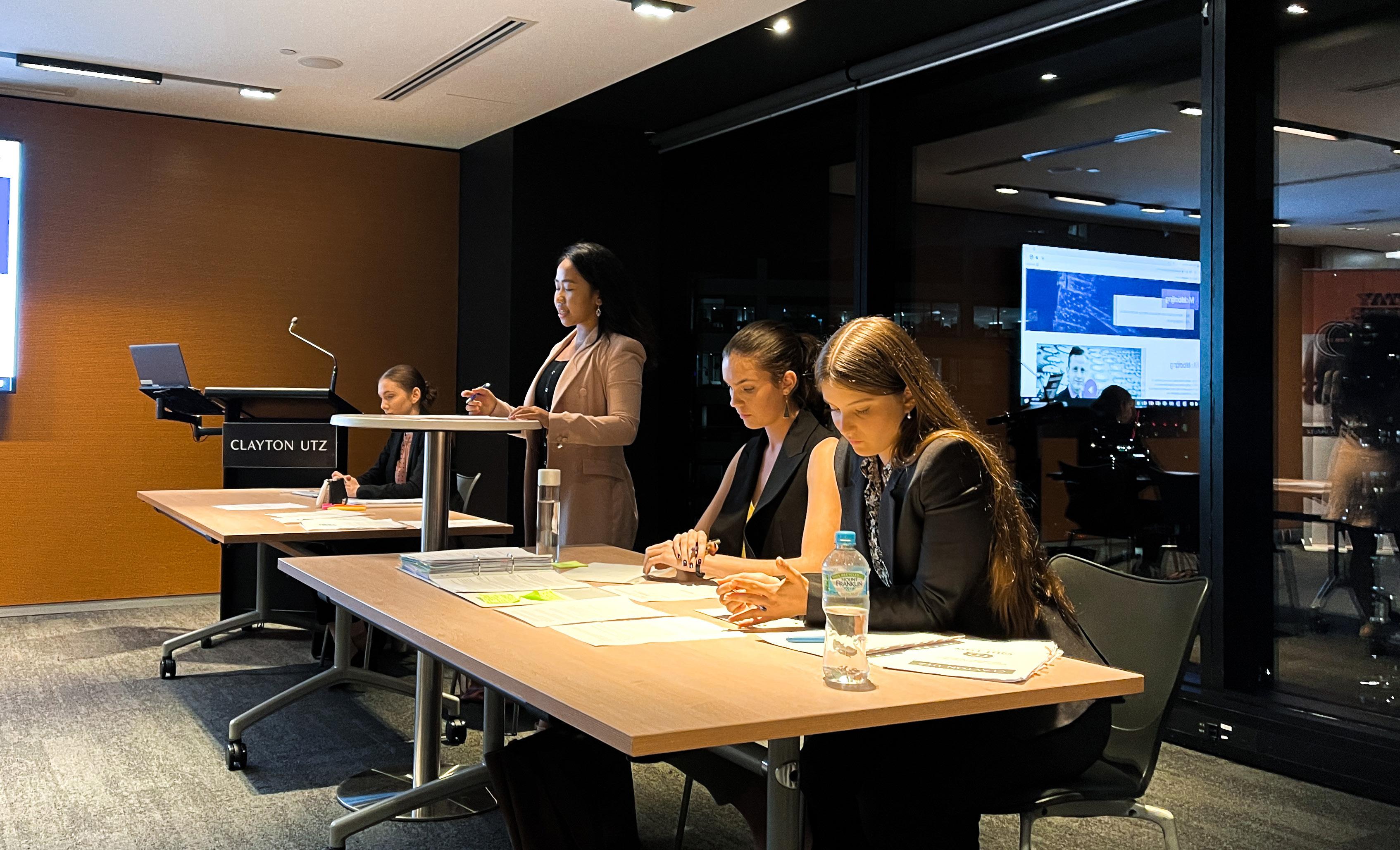


43
INTERNAL COMPETITIONS
The QUTLS Competitions portfolio creates engaging opportunities for students of all experience levels to develop their legal research and advocacy skills, make connections, and explore potential career paths. The competitions are tailored in such a way that students can put into practice the theoretical knowledge gathered during university in a real-world context. The competitions are judged by industry professionals and senior students who give you on-the-spot invaluable feedback and advice – a law student’s most precious commodity!
Competition winners and runners-up may also be invited to represent the QUTLS at a state or national level, providing further opportunities to enhance your skills and grow your networks.
Registration for competitions opens about one month before the competition begins, so keep an eye on the QUTLS Facebook page for announcements and check out the website for updates and registrations.
SEMESTER 1
• Negotiation
• First Year Moot
• Championship Moot

ADVICE FROM THE PORTFOLIO

SEMESTER 2
• Junior Moot
• Client Interview
• Witness Examination
Engaging in competitions in your first year is a great way to maximise your potential and growth. Particularly in your first year, it is a great way to meet new people, make friends and fast track your learning. The skills and experiences you have in the QUTLS competitions can expose you to a variety of more prestigious competitions in the future.
Have questions or just want more information? We’re always down for a chat! Email us at internalcompetitions.officer@qutlawsociety.com or visit us in the QUTLS Office in C Block.

44
44
ALL THE INFO ABOUT THE INTERNAL COMPS:
NEGOTIATION - OPEN TO ALL STUDENTS
The Negotiation is one of our most popular competitions, in which teams of two face off as ‘solicitors’ advocating for their respective fake clients. The purpose of the Negotiation is to represent your client’s interests while coming to a mutually beneficial outcome for all parties. Students love this competition as minimal preparation is required.
FIRST YEAR MOOT - OPEN TO FIRST YEAR STUDENTS ONLY
The First Year moot focuses on what you will learn in Torts (as well as some extra topics to test your research skills). Previous participants rate the First Year Moot as the most beneficial and valuable competition in the entire portfolio. As well as challenging yourself, you’ll likely forge friendships that last well after you graduate (even if you find yourselves on opposite sides of the case). In 2021, the winning team will face off with UQ’s First Year Moot winners.
CHAMPIONSHIP MOOT - OPEN TO ALL STUDENTS EXCEPT THOSE PARTICIPATING IN THE FIRST YEAR MOOT
The Championship Moot is the premier event for mooters, judges and spectators. Competitors will be provided with a complex commercial litigation problem, testing their academic rigor and oral advocacy skills. While it is our most challenging moot, it is open to students of all levels and is a great opportunity to develop your skills.

JUNIOR MOOT - OPEN TO ALL STUDENTS WHO HAVE NOT YET COMPETED NATIONALLY
Don’t let the name confuse you, the Junior Moot is for students at all levels, so long as they have not won the competition or competed at a national level. With the problem usually simpler than the championship moot but still challenging, it is a wonderful opportunity for first time mooters or for experienced mooters to further develop their skills.
CLIENT INTERVIEW - OPEN TO ALL STUDENTS
Students are exposed to a scenario and are required to interview a client to identify the complete facts behind their personal experience and propose possible solutions specific to the legal problem at hand. It is a great chance for students to build essential communication, listening, body language, asking appropriate questions and more skills required to engage with individuals in the real world.
WITNESS EXAMINATION - OPEN TO ALL STUDENTS
Fondly nicknamed the WitEx competition, this competition entails the examination and cross-examination of a witness giving oral evidence. Unlike traditional moots, this competition is conducted individually.
Keep an eye out for the Competitions Bench Book in Welcome Week, which will provide a step-by-step guide to competing in all of the QUTLS’ competitions. Check out our website for more information on each competition.
SENTENCING COMPETITION - OPEN TO ALL STUDENTS
Sentencing competition gives you the opportunity to represent either the prosecution or defence in a mock criminal sentencing hearing.
45
EXTERNAL COMPETITIONS
External Competitions at QUT are a fantastic way to have fun while also further developing your legal skills and connections. External competitions are an opportunity to represent QUT against other universities both nationally and internationally. There are certainly competitions available to both the novice and experienced competitor, and many students who have participated in internal competitions previously chose to try their hand at externals!
There are so many reasons to get involved in external competitions, especially as a first year! The nature of external competitions is that you will always get to make connections with students from other universities as well as academics and industry professionals. Often these competitions involve travel as well. You will be exposed to many different areas of law and gain an insight into practical legal tasks such as research, advocacy and many others.
There are a range of different competitions on offer throughout the year and each will help you to improve the suite of legal skills taught throughout your degree. Certain forms require more preparation than others and have very different structures. For a breakdown of legal competitions as well as more information refer to the QUT Competitions Benchbook.
Some of the large intervarsity competitions held yearly include the Australia Law Students Association (ALSA) Competition and the Queensland Intervarsity Law Competition (QILC). We also source other competitions around Australia and internationally that call for entrants or submissions.
WHAT IS ALSA?
ALSA coordinates several prestigious national competitions each year. The winners of QUTLS internal competitions are often chosen to represent QUT and compete against similarly skilled students from across the country. However, this is not always the case and budding competitors are also welcome to participate. The QUTLS has entered teams into the Championship Moot, Negotiation, Client Interview and Witness Examination competitions run by ALSA.
WHAT IS QILC?

QILC is a great opportunity for budding advocates in Queensland to further develop their legal skills. It is well suited to beginner and experienced competitors, and also requires volunteers. There are four competition streams: mooting, negotiation, client interview and witness examination. The competition is a week-long event including many networking and social opportunities with other participating universities (all law schools in Queensland are invited to participate). The grand finals are often hosted in the Supreme Courts. Spectators are always encouraged!
There will also be lots of competitions that come up throughout the year which QUT are invited to, so be sure to keep an eye on our socials! The QUT x UQ Grudge Moot is also a highly anticipated external competition which runs yearly. The winners of the QUT First Year Moot will compete against the winner of the UQ First Year Moot and face off in the ultimate showdown.
If diving head-first into a mooting competition seems a bit daunting, you can always volunteer or even just come along as a spectator and support QUT! If you have any further questions about external competitions at QUT feel free to get in touch via director.externalcompetitions@qutlawsociety.com
46
46
CREATIVITY

The Creativity Portfolio aims to provide QUTLS members with an outlet to entertain and be entertained. We have a number of ways you can get involved!
LAW REVUE
The QUT Law Society Law Revue is an annual comedic stage show written and performed by current law students. University Revues have a longstanding tradition within legal and medical schools the world over, serving as a creative centrepiece and outlet for students.


The 2023 Law Revue will feature a loosely-related series of sketches, songs and videos, providing a satirical take on TV, movies, news, current affairs and politics, in addition to lampooning university life and the legal profession as a whole.
So, if you’re an aspiring actor, singer, musician or dancer: come along to this year’s auditions. If you’re a would-be writer, videographer or choreographer and are looking to showcase your talents: show us what you’ve got. If you’re keen to get involved but don’t fall under any of the aforementioned roles: we’d still love to have you on board as part of the crew.
GEORGE STREET JOURNAL
The QUTLS also has a satirical news site that keeps you up to date on all things law school in the 21st century. It is open to student submissions, so if you love The Betoota Advocate and similar publications, you need to make sure you are following the George Street Journal!


• FACEBOOK | The George Street Journal
• INSTAGRAM | @thegeorgestreetjournal
If you have a penchant for all things satire, please send submissions to director.creativity@qutlawsociety.com
If you’ve got any questions feel free to email us via: lawrevue@qutlawsociety.com or director.creativity@qutlawsociety.com
GEORGE STREET JOURNAL
47
DIVERSITY, CULTURE & WELLBEING
QUTLS’ Diversity, Culture and Wellbeing portfolio is committed to giving each law student at QUT an equal and fair opportunity to succeed, whilst celebrating our differences and seeking to understand them. We are aspiring to create a positive difference in the wellbeing of law students, whilst celebrating our diverse cultures and backgrounds. The aim for our portfolio is to improve inclusivity within the Law School while drawing attention to gaps within the Law Society, university and wider legal community.
WHAT DOES 2023 HAVE IN STORE?
Our focus for 2023 is expanding on our pre-existing initiatives. We will be further addressing and raising awareness around financial equity, disability support, culture and diversity, issues faced by LGBTIQA+ students, external students, international students and First Nations peoples.
The QUT Law Society is committing to expanding upon our young portfolio with the addition of new officers. These new roles will help us better represent all law students and bridge gaps within the legal industry. We hope that these new officers will offer fresh insight and strengthen collaboration across the entire Law Society.
This year the Diversity, Culture and Wellbeing Portfolio are hosting four major events which will include the: Women in Law Breakfast, First Nations Breakfast and LGBTIQA+. All of these events pose great opportunities for you to connect with local firms whilst showing your solidarity with the members of these communities.

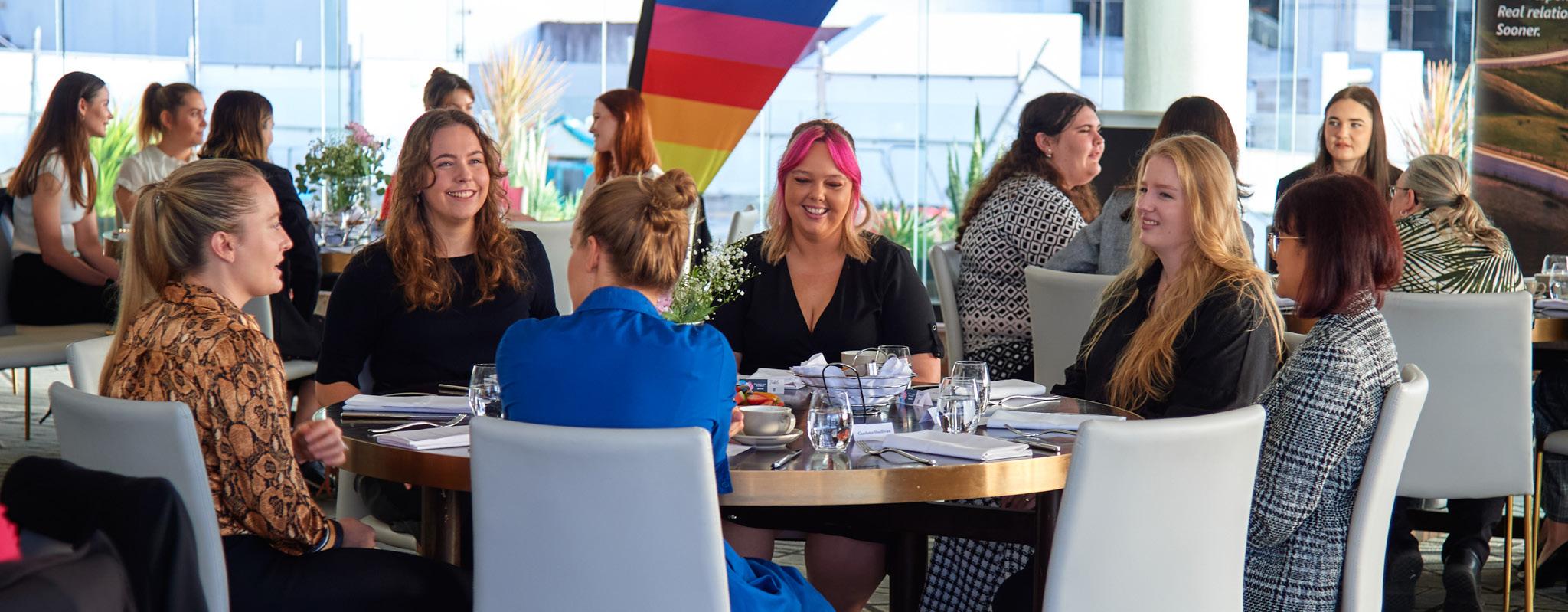
WOMEN IN LAW BREAKFAST
The Women in Law Breakfast celebrates the incredible achievements of women within the legal profession. With over 60% of our graduates being female this is an excellent opportunity to show your enthusiasm for equality within the profession. With a history of influential speakers and high attendance rates from fellow students and professionals, the Women in Law Breakfast is one not to be missed.
48
build friendships with people who are experiencing many of the same struggles and fears.
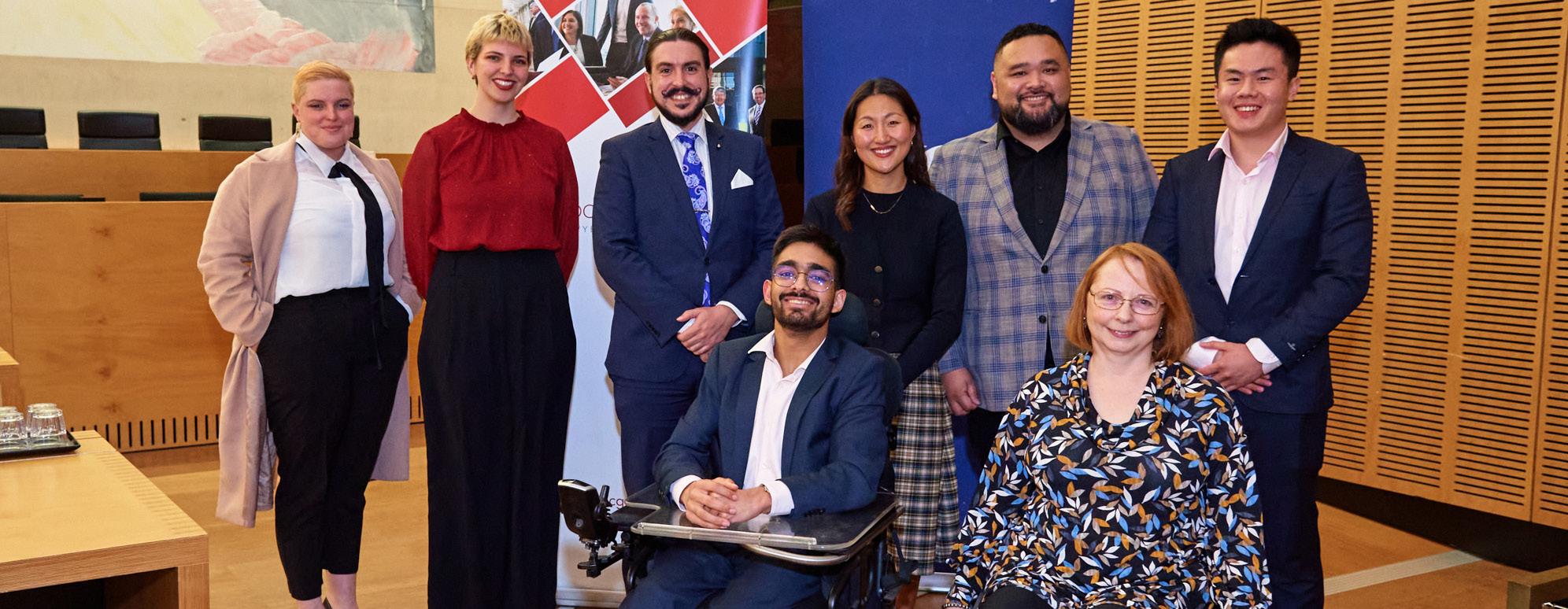
FIRST YEAR PIZZA PARTY
The First Year Pizza Party is an informal social event for first-year law students to meet their peers, first-year professors, and members of the QUTLS. This event is an excellent way for first-year students to ease their transition to university life. The First Year Pizza Party is the perfect opportunity to build friendships with people who are experiencing many of the same struggles and fears.

49
FIRST NATIONS

FIRST NATIONS BREAKFAST
The First Nations Breakfast is a step in the ongoing journey of Reconciliation between First Nations people and non-indigenous Australians. The Breakfast provides a platform for First Nations students and professionals to voice their opinions and highlight the need for equal access to opportunities and education, and the importance of continued Reconciliation across Australia. This significant event is a brilliant opportunity to share your appreciation for one of the world’s oldest cultures and show your commitment to both Reconciliation and equal opportunities for First Nations Law students.
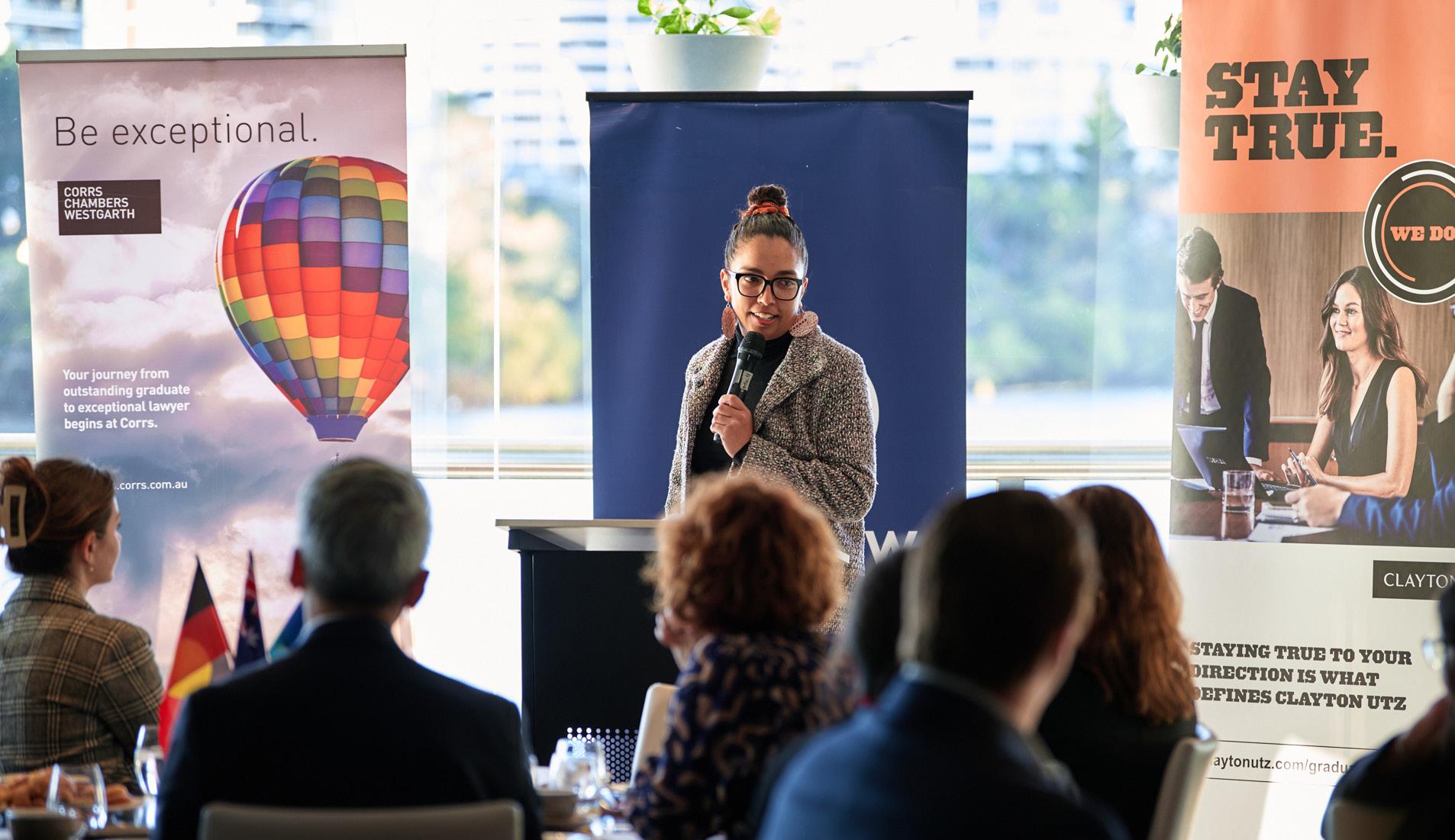
OTHER EVENTS TO WATCH OUT FOR
Don’t miss out on the First Year Social, the LGBTIQA+ and the Law Forum event, the Domestic Violence Awareness Breakfast, the external students lunch, the Law Ball, Meet the Profession, Welcome to Moot Club and the First Year Moot. These are all great events to get you started within the Law Society.
If you have any questions about our portfolio or just want more information, we are always available for a conversation! Email us at director.dcw@qutlawsociety.com or visit us in the QUTLS Office in C Block.
50
SPORT AND HEALTH
The Sport and Health Portfolio is an integral part of the support network provided by the QUTLS for students throughout their law degree. The aim of the portfolio is to promote the mental and physical wellbeing of students and facilitate positive social interactions.
MENTAL HEALTH EVENING | FRIDAY 12TH MAY 2023

The Mental Health Awareness Evening aims to openly promote awareness of, and support for, community mental health and wellbeing. This intimate evening provides a safe space for students to have a broad discussion about the current mental health issues affecting workers in the legal industry. Students will hear from legal industry professionals about their own experiences with mental health and receive advice regarding the ways in which you can achieve a work / life balance which cultivates a healthy mental state and positive attitude.
VARIOUS CHARITY EVENTS | DATE TBA
The QUTLS will enter several teams into various charity events throughout the year. This includes the LawRight Walk for Justice, Women’s Legal Service River to Rooftop and Bridge to Brisbane. Charity events are important to our society members as they are an opportunity for you to combine physical activity, socialisation and giving back to the community.
EXAM PRODUCTIVITY & WELLNESS PACKS |
22ND - 25TH MAY 2023 AND 9TH
- 13TH OCTOBER 2023
One of the most popular mental health initiatives run by the QUTLS is the preparation of Exam Productivity and Wellness Packs. Near exam time, the QUTLS puts together productivity packs to assist students in their study. The productivity packs contain items such as snacks to motivate students with their studies, as well as wellness and support resources to help make those long hours in the Law Library seem a little less tedious.
QUTLS SOCIAL SPORT PROGRAM | SEMESTER 1 & 2
The QUTLS Social Sport Program is a way for members to participate in a fun and social extra-curricular activities. Each semester, the QUTLS opens up a registration form where students can sign up and form teams for touch football, soccer and netball. No matter what your level of fitness is, all QUTLS members are welcome to participate. The registration fee for members is subsidised and includes a QUT Law Society jersey.
GRUDGE MATCHES: QUTLS V UQLS | 29TH APRIL 2023 AND QUTLS V GULS | 1ST SEPTEMBER 2023
The Grudge Matches allows students to engage in a fierce but friendly competition against their friends and adversaries, bringing different universities together and promoting healthy habits. The types of sports played in the Grudge Matches vary from year to year. Overall, the Grudge Matches are designed to instil camaraderie amongst law students who will be entering and working together in the law profession post graduation.
51

LAW SOCIETY CLERKSHIP LAWYER UNIVERSITY TUTORIAL LECTURE ELECTIVES MOOTING QUTLS AGLC STUDY WALS 52
A W J F L Q M T C L A W Y E R W G B E Z A U U Q T W I U O P Q R L P U B W T V J E L U Q R F I C C C U Z S L M Q E U J X S S R L M T N C O S E V G B J W T U L E O U O G C S B N H I A U W N E R O T V A I P Z A C T D A A I C K T O P D E O X Y V Y L W J V T S I R S H T Z O H U S V D S E U H N I E K Y X S U H L D A A R R I G A M G J B H U P X Z I V S E P H L S V V H S L E L E C T I V E S L I X J H V N X V B J Y T I I V M Z A P T B K J A X D U Y Q U O
WORD SEARCH
SMART GOALS
This section is for you to consider exactly what you want your first year to look like! Do you want to try mooting? Make more friends? Join a sports team? Practice your networking skills? Here you can record some first year resolutions! Remember to write your goals out using the SMART method to make sure you can achieve them!
START OF SEMESTER 1, 2023
What do you want to do in your first year? What kinds of experiences do you want to have?
END OF SEMESTER 2, 2023
Think about your hopes and goals that you wrote down all the way back in February. Was your year anything like you expected? What would you have changed? Are there new things you’d like to try in the years to come?

p e c i f i c
53
m e a s u r a b l e a c h i e v a b l e r e l e v a n t t i m e l y
you enrich and expand your worldview, grow your skills and influence new ways of thinking. In other words, we’ll help you make the difference.
Begin now at ashurst.com/careers

Connect with us on
54
Reach your potential

Join a major Australian law firm.


Starting your legal career at Thomson Geer will offer you real, hands-on experience across a wide variety of commercial disciplines and industry sectors, in a supportive and collaborative environment.
We’re ready for you
With over 560 people, including 138 partners across Sydney, Melbourne, Brisbane, Perth, Adelaide and Canberra, we’re one of Australia’s 10 largest law firms and its 5th largest independent one.
We offer a flexible, friendly and professionally stimulating environment that puts both our trusting client relationships and our staff’s wellbeing and development at the forefront.
From day one, you’ll be an active participant in the team, involved in all aspects of legal practice, and working directly with experienced practitioners.
Are you ready for us?
We’re looking for hard-working and motivated law students who have excelled academically, are customer focused, commercially minded, work well in a team environment and are ready to commence their career with a major law firm.
We are especially keen to talk to students who have, or are working towards a second degree in technical fields, such as commerce, engineering and science.
Who are we looking for?
All of our clerks are viewed as potential graduates, and all of our graduates as potential leaders. We therefore look for the same qualities in our clerks and graduates that our lawyers need to possess.
Thomson Geer @ThomsonGeer tglaw.com.au
55











































































 Cass Hewson HR Manager
Cass Hewson HR Manager


































































